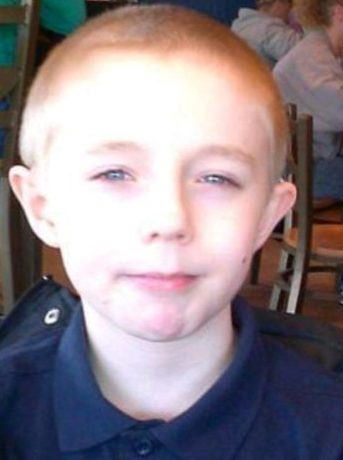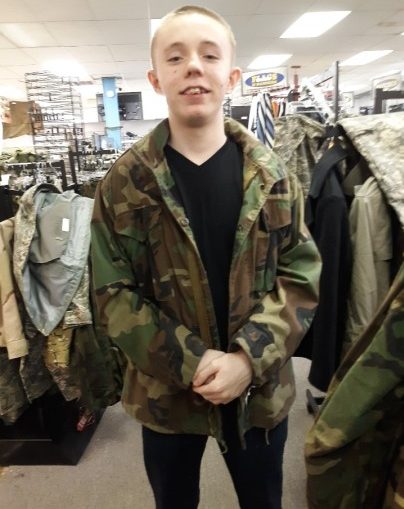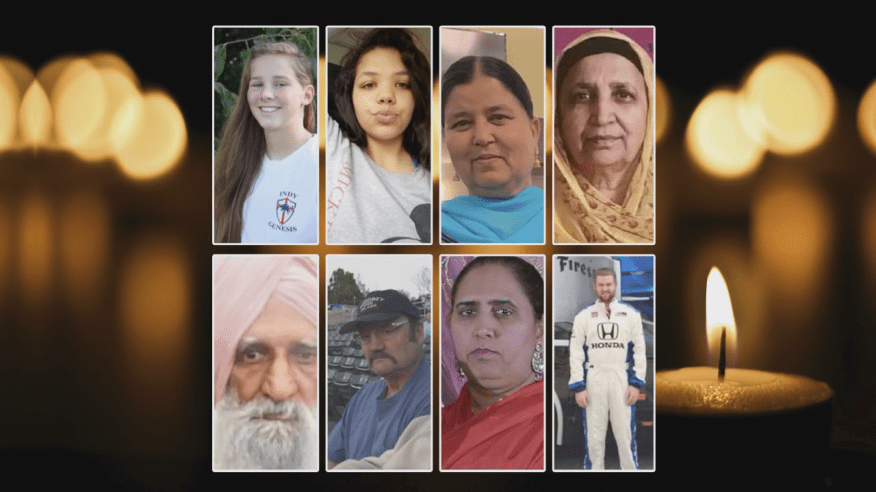FedEx shooter’s mom says son ‘should have been red flagged’
INDIANAPOLIS (WXIN) — Brandon Hole was on law enforcement’s radar more than a year before the mass shooting of eight people at the FedEx Ground Facility in Indianapolis, but NewsNation affiliate WXIN’s Angela Ganote didn’t know the extent until after speaking with his mother.
Sheila Hole sat down for an exclusive interview with Ganote. She told Ganote she understood the ramifications. She believes many people will question how she raised her son and if she got him enough help.

She came to Ganote to detail the steps she took, hoping red flags will be taken more seriously and the next young man can be stopped before becoming a mass shooter. As she told Ganote, she doesn’t want sympathy. She wants to say she is sorry.
It was April 15, 2021 at 11 p.m. Brandon Hole drove to the FedEx Ground facility on the southwest side of Indianapolis where he had once worked. Minutes after the first 911 call, police found the 19-year-old had killed four people outside and four people inside the facility. He then turned the gun on himself.
His mother told Ganote, “I won’t grieve his death. I can’t. I grieve the victims’ deaths because it’s not anything I ever thought would happen.”
Brandon’s Life Growing Up

Brandon grew up enjoying fishing and roller coasters, but his mom said from the age of 3, he struggled with obsessive compulsive disorder, often felt alone and could not control his anger.
That was also the age his dad committed suicide.
The following is a timeline — a summary of several major events that happened in the boy’s life. His mother is hoping someone will take notice and either strengthen current laws or someone will have more empathy when trying to get others help.
She shared her son’s medical records dating back more than a decade that show he likely suffered from an anxiety disorder with panic attacks and major depressive disorder, and often thought of suicide.
“I know that he did have problems and I did try to get help. I tried so hard and I thought mainly — mainly the fight was so he wouldn’t kill himself.”

At the age of 10, her son was diagnosed with disruptive behavior disorder and anxiety disorder, and was prescribed 5 milligrams of Lexapro, a medication to treat depression and anxiety. A month later, a diagnosis of obsessive compulsive disorder was added when the boy’s mom reported “odd” behavior. He demanded “to wear three pairs of shorts,” “rocked back and forth while he watched TV” and, “If his routine was disrupted, it would often take hours to get ready.” He was tardy to school a lot.
In the medical records, he told a nurse that he didn’t want to be angry, but at times “he loses control.” He admitted, “Mom has had to call police when he had been abusive to her.”
A year later, in 2013, Brandon was arrested for the first time — he was 11. He was charged with battery, criminal confinement and intimidation. He was accused of kicking and punching his mom before grabbing two table knives and stabbing her, slightly injuring her.
He was held in a juvenile facility for a few hours, went before a judge a few weeks later and got probation. He got some counseling too, but his mother said he was still suspended from school several times for fighting and in 2014 she started home-schooling him.
During this time period, a social worker was coming to their home two days a week.
2020: Brandon’s mom tries to get him help
The next several years went on as Sheila Hole tried to help her son manage his anger at home with very little socialization. He didn’t have many friends and by March of 2020, she was so frightened of her son’s anger, she went to police for help. At this point, he was no longer taking the Lexapro or any other medication that she can remember.
“To get to that point, for any mother to get to that point, that’s a red flag. You know, I didn’t sit on the phone and say my baby might hurt himself or something like that. I went beating on doors, knocking them down if I had to.”
March 2020
On March 2, Sheila Hole went with her son to what they called the Army surplus store. They went there often because he loved the Army, he would eat MREs and then he bought a gun. Many have asked why his mother allowed it. Brandon was 18 and was going to buy a gun, with or without her, and she went so she knew what he was doing.
Sheila told WXIN her son had threatened suicide many times and said he wanted to die from suicide by cop. “To me, he was going to kill himself and he needed help. He needed to be detained. He needed counseling. He needed medication.”
Sheila told Ganote she was thankful the store was out of bullets. While Brandon slept, his mother made a plan and went to East District roll call in person. Several IMPD officers, including members of the Mobile Crisis Assistance Team, or MCAT, came to the house.
Brandon was handcuffed, his shotgun confiscated and he was taken to Eskenazi Hospital. Sheila hoped they at least would put him on a 72-hour hold. “No longer than two hours was he at Eskenazi and I get a call telling me he was walking home or I was picking him up.” According to the medical records, he was seen by a doctor who wrote the young man denied wanting to die via police and that he “feels fine.”
His mother believes that if the concerns she raised about Brandon’s mental instability were enough for police to seize his gun, authorities should have used Indiana’s red flag gun law, often called the Jake Laird Law after slain Indianapolis police officer Jake Laird, to keep Brandon from getting more guns in the future.
“He should have been red flagged. I’m sorry Jake’s parents worked so hard to have that law so nothing like this would happen again, or at least prevent some of it. You have to implement it first. It’s there. Can you use it? I’m appalled, and everyone else should be too.”
Marion County Prosecutor Ryan Mears declined to talk to WXIN for this story, but said in April that because Brandon Hole surrendered his gun, there wasn’t a reason to pursue the case further.
Sheila Hole said that was a mistake. “I just know I needed help. He needed help and that is not ultimately, that’s not what we got because you see the outcome. The horrific happening, awful. It’s awful.”
After that incident, the FBI was contacted to take a look at what police described as “very disturbing neo-Nazi content.“
April 2020
Sheila Hole first met with a member of the FBI Joint Terrorism Task Force in April 2020. “He turned to me and said, ‘Your son hits every red flag for a mass shooter.’ And that’s when I said, ‘Well you need to go and arrest him and take his computer.’”
April 15, she said the agent and an Indiana State Trooper came to the house to talk with her son.
She wrote about that meeting after the mass shooting, recalling her son felt traumatized by the experience, asking him about buying the gun, if he got on 4chan and if he liked “My Little Pony.” Sheila said her son was angry the agent questioned his obsession with “My Little Pony,” saying it was how “neo-Nazis” talk to each other. She said Brandon told the agent he hadn’t talked to anyone concerning neo-Nazi rhetoric and the FBI could look on his computer.
We reached out to the FBI to confirm the conversations but they declined to talk to me.
2020: Brandon used stimulus money to pay for guns
During the next several months, Brandon bought two more guns using his stimulus money. One cost $1,000.
“It was over $1,000. It was a thousand, four hundred or something of that nature. And when a detective asked me, ‘Where did he get the money to fund that kind of weaponry?’ The government.” You guys gave my son over $3,000s in stimulus money. Don’t give it to me, where I’m helping pay his light bill and whatnot. You didn’t give it to me. You gave it to a suicidal mental teenager.”
2021: Brandon goes to emergency counseling
The mother said her son became more unstable in 2021, even calling the FBI agent to confront him about the neo-Nazi accusations. He feared the FBI had a file on him and that he would never be allowed to join the Army.
His mother took him for emergency counseling. At this point, she said her son carried the business card of the FBI agent with him at all times.
“He was like, ‘this is stressing me out and this is people I have to deal with.’
According to a letter from the Midtown Westside Clinic, an affiliate of Eskenazi Health, it was understaffed on Friday, March 19 of 2021, and after waiting four and half hours, Brandon couldn’t be seen.
Three days later, he met with a licensed clinical social worker, saying, “I can get very very angry.”
Records of the session show he said he doesn’t have empathy, he doesn’t care about the lives of others. He was deemed a moderate suicide risk and given a suicide plan.
March 31, 2021: Brandon meets with social worker
Nine days later, on March 31, Brandon met with a different social worker and he shared many of the same thoughts and feelings.
That social worker also detailed the experience with the FBI and police, saying Brandon admitted “he tried to hang himself” after the experience.
April 14, 2021: Brandon has his final counseling session
Then a day before the mass shooting, in the final hours beforehand, Sheila was with Brandon in his last counseling session.
“I had to go in with him because I wanted to tell them how traumatizing it was that the FBI and IMPD, the way he was treated by them,” she recalled. “It was very traumatizing to him and I needed to tell them that. I needed him to tell them that he hit me so that they would understand that this was at a level where maybe there are more red flags for you.”
She said she asked for more time. They scheduled several weekly sessions.
And then time was up.

The next day, in a matter of seconds, Brandon killed 32-year-old Matthew Alexander, 19-year-old Samaria Blackwell, 66-year-old Amarjeet Johal, 50-year-old Jasvinder Kaur, 68-year-old Jaswinder Singh, 48-year-old Amarjit Sekhon, 19-year-old Karli Smith and 74-year-old John Weisert.
“I just want people to know that if there’s something wrong, and I wish I could tell them who to call because I don’t know,” Sheila said. “Maybe they could call me and I would try to help them, because now I have nothing. Want to see me bust down some doors and get you some help? I bet I do. Maybe I didn’t do it for my son but I will for you. And I am so sorry for them. I am very, very, very sorry. There are no words.”
WXIN reached out to Eskenazi to try to talk with anyone there, including Brandon’s doctors and social workers. They did not wish to comment. Ganote also reached out to IMPD, the FBI and the prosecutor and all of them declined interviews.
During a news conference in July, the FBI found there was no racially motivated, violent extremist ideology identified during the investigation. The FBI defined what Brandon did as, “a suicidal murder and a way for Brandon to demonstrate his masculinity.”
His mother doesn’t know what to call it, but says her son hated himself and he committed crimes. She still wants to know what content the police saw on her son’s computer. She wishes the domestic abuse against her would have been taken more seriously, along with her son’s past arrest for stabbing her when he was 11.
She also asked Ganote to pass along a message to victims.
“I will never accept what Brandon did, and if they ever need anything from me, I am here for them.”














